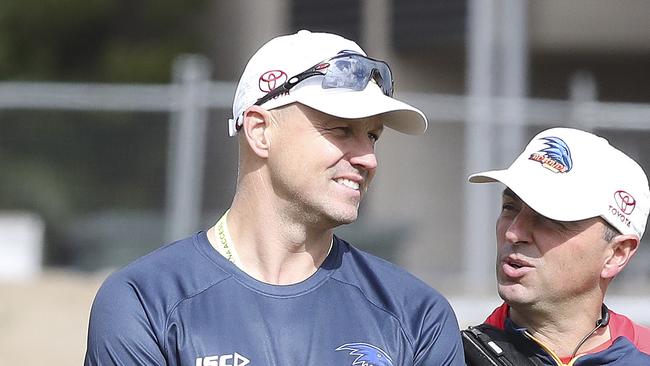How new coach hopes to drag Crows out of darkness into a bright new era of success
New Adelaide coach Matthew Nicks says he wants to build relationships and a culture of success at Adelaide. So what exactly is “culture” at a footy club, asks Simeon Thomas-Wilson.
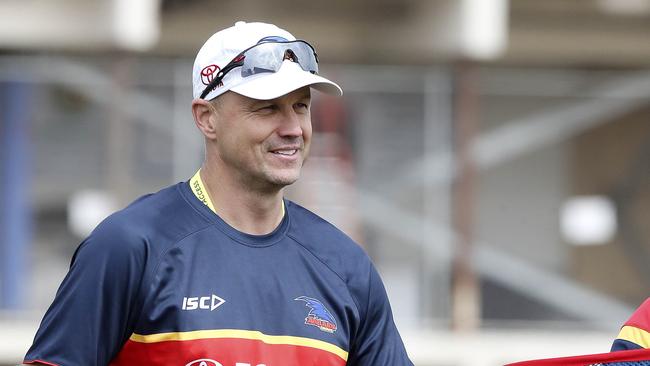
Crows
Don't miss out on the headlines from Crows. Followed categories will be added to My News.
- Crows coach confident Brad Crouch will re-sign
- How to get the most out of your Advertiser digital subscription
Matthew Nicks is big on the importance of culture. During the media conference unveiling him as the new Crows senior coach the words culture, relationships and respect were ever-present.
“A lot of people talk about my ability to build relationships, I’ve been in that space right from the start and I believe if you want to be successful you have to have mutual respect and a good relationship between both coach and player,” Nicks said last month.
“So I will be pushing that from this moment forward with our playing group, administration and football department. We put ourselves second and teammates first as well as colleagues.”
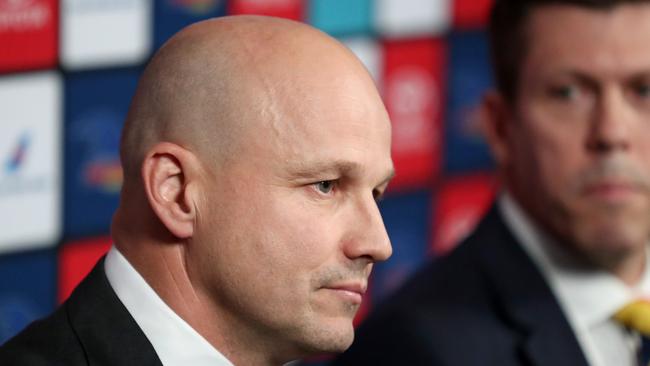
This came after the boss of the external review commissioned by the club, Jason Dunstall revealed to The Advertiser that a “culture of self preservation” had plagued the club in recent years and contributed to the poor performances following the Crows’ defeat to Richmond in the 2017 Grand Final.
But what is culture and why is it now considered to be so important to success at AFL level?
University of South Australia lecturer Scott Adams who has lectured about team dynamics for 10 years says culture is the broader reflection and demonstration of what a team is about.
“It’s bigger than the football department, it starts from the top down,” he said.
“It is the sum of the whole group it’s the purpose for existence, who are you, what are you about, what are your norms.”
Stream over 50 sports Live & On-Demand with KAYO SPORTS on your TV, computer, mobile or tablet. Just $25/month, no lock-in contract. Get your 14-day free trial and start streaming instantly >
Adams said good team culture drives engagement and higher standards of performance from individuals, who are more motivated and committed to the cause.
He said for this occur there was heightened “trust, cohesion and commitment” upheld by all team members to stick together and remain united in pursuing common goals.
“Trust is really important and it’s become a bit of a buzzword as well, good teams always talk about trust – “there is good trust in the team”.
“What it means is that if you have increased trust in the group then people are emotionally safe to give their all, to give their everything … they aren’t holding back in anyway.
“Whether it is honest feedback, honest reflection of themselves or having the courage to talk to a senior figure about something, if you have full trust then you can give your everything and that leads to heightened success.”
Upon their departures from the Crows, Cam Ellis-Yolmen and Hugh Greenwood said the club’s controversial 2018 Gold Coast camp “hurt the culture of the club”, “divided us” while “internally that stuff was bubbling”.
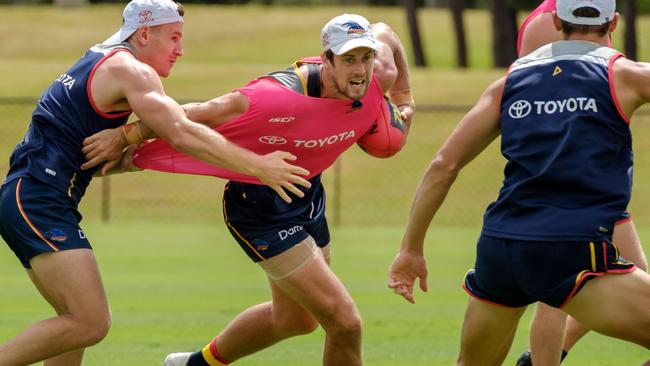
Crows chairman Rob Chapman also said the camp had broken trust among the playing group.
It is understood that as part of “mind training” to improve resilience players were confronted with personal details that could have only come from within the club.
“Certainly from an outsiders point of view and what we have gleamed from players comments to the media there were certainly fractions in groups, and they keep going back to the camp where there was ultimately a loss of trust,” Adams said.
While the Crows have been criticised both inside and outside, it is the Tigers, Collingwood, GWS and Brisbane that are widely considered to have the best cultures in the AFL.
Richmond senior coach Damien Hardwick hand-wrote personalised letters to each Tigers player about their own personal journeys before their preliminary final over Geelong.
He also leaves trinkets and presents in front of all their lockers before each game.
In almost identical circumstances to Adelaide this year, in 2017 Collingwood created the position of leadership and culture – filled by Premiership captain Nick Maxwell – to put relationships at the front and centre of how the club operated.
This, plus Nathan Buckley’s willingness to change how he operated as a senior coach – and, along with Maxwell, took the club to a place where “the top-down mentality no longer exists”.
“We were a chest beating club, we were arrogant … and I was a part of that,” he said in the Collingwood: From The Inside Out documentary.

But while the importance of culture is now in vogue in modern AFL, fuelled by the two Melbourne giants’ emphasis on relationship building, much of the idea’s basis has its roots in the northern suburbs of Adelaide.
It was at the Elizabeth Oval in 1992 that a former RAAF training and leadership Ray McLean introduced a pilot program – now known as Leading Teams – involving the then struggling Central District Football Club.
The success of this program, focusing on a common purpose, agreed behavioural frameworks, strong professional relationships and “genuine conversations” helped Bulldogs coach Alan Stewart transform Centrals fortunes in within a matter of years – setting the club up for one of the most dominant periods in SANFL history.

Five-time Bulldogs Premiership player, four of them as captain, and former St Kilda player Daniel Healy experienced the Leading Teams model as a player and is now a facilitator for the program – working with some of the biggest clubs and businesses in South Australia.
He told The Advertiser the importance of good team culture had remained undervalued for years.
“I was very lucky to be involved early on in that (the Leading Teams model) as an athlete but for the founder Ray McLean to get any traction with culture back then was very hard,” he said.
“The concept back then was very difficult to sell … but we don’t think the importance of culture has increased we just think people are finally coming round to it and working it out.
“And the successful teams continually focus on it … we think it is the culture that can actually drive our performance not the other way round.
“I was at Central District when we were a basket case of a club and we turned it around. Predominantly it wasn’t through our game plan or change in personnel it was because we committed to a set of behaviours and we decided to keep each other accountable to it.
“We were able to improve our performances as a result, nothing to do with skill level or game plan.”
From Elizabeth, McLean and Leading Teams next went to Sydney where he linked up with new Swans coach Paul Roos and created “the Bloods culture” – thrusting the term culture well and truly into the AFL lexicon.
Last month Roos wrote in The Australian that cohesion from the top down was key.
“Everyone was aligned on who we wanted to be, how we were going to act, everyone knew their roles. There’s absolute clarity in successful organisation. There can’t be infighting or factions,” he wrote.
“There has to be trust. Without trust, it just creates a really poor environment and sooner or later, the results are going to reflect that.”
One of Roos’ disciples was Nicks, who absorbed the Bloods culture during his 175 games as a Swan.
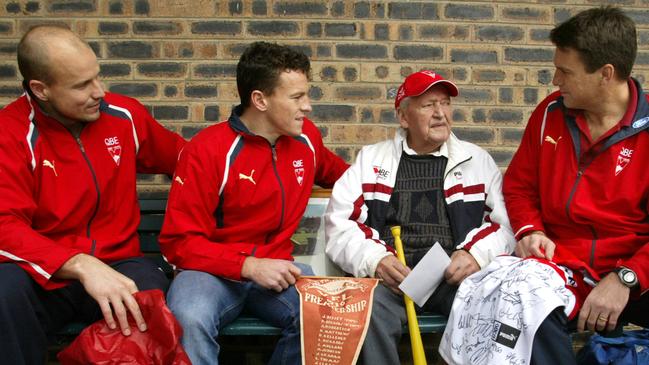
Healy, who worked with Nicks at Port Adelaide for three years, said he was confident the new Crows coach would keep pushing culture.
“But the challenge is what do you do when you get the top job and get into it. The culture doesn’t get tested now when everybody is happy and there’s a new coach and we are running around with our tops off in 30 degree heat.
“The culture gets tested when your performances aren’t going so well, you have injuries, players are pissed off with form and so forth and so on
“That’s the challenge … but I guess knowing him as I do, that is not just words used to get the job that is who he is.”
To help drive this renewed focus on culture at West Lakes, the Crows are on the hunt for someone to fill their newly created position of head of leadership and culture – based on what Maxwell did at Collingwood.
Adelaide chief executive Andrew Fagan told The Advertiser the Crows had received significant interest for the new position, but would fall behind a new head of football in terms of the club’s priorities.
Healy said it was all well and good creating a position to focus on culture, but the challenge was giving it the time and attention it deserves.
“The leaders need to value relationships and the culture and the test is will they prioritise that over the skill based stuff which is the challenge in modern sport,” he said.
“The absolute number one person behind people and culture and driving that has to be the senior coach and senior people in the organisation.
“When they buy in and get behind it, it is pretty bloody easy but if they theorise about it and don’t bring it into place that’s when you have issues.
“So the key thing is that it starts at the top … it will start with Nicksy and the people around him.”
